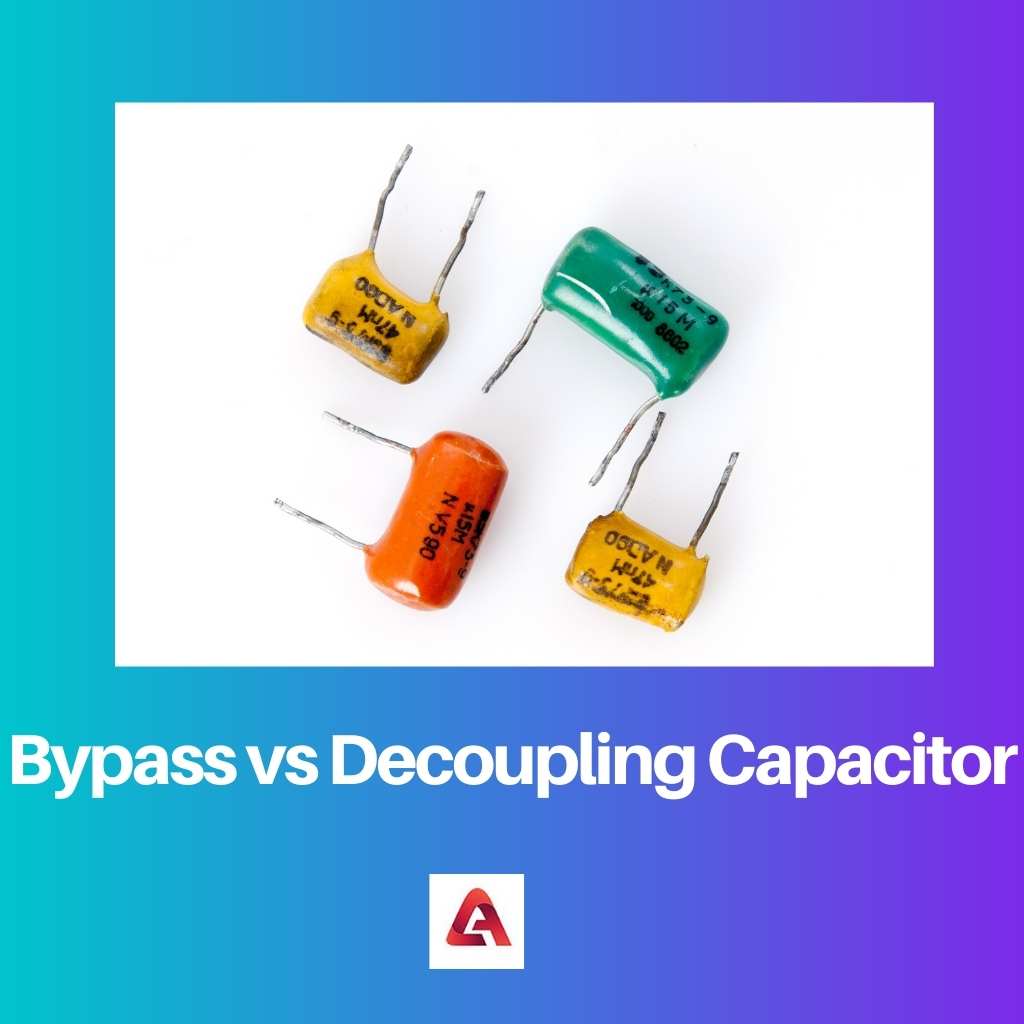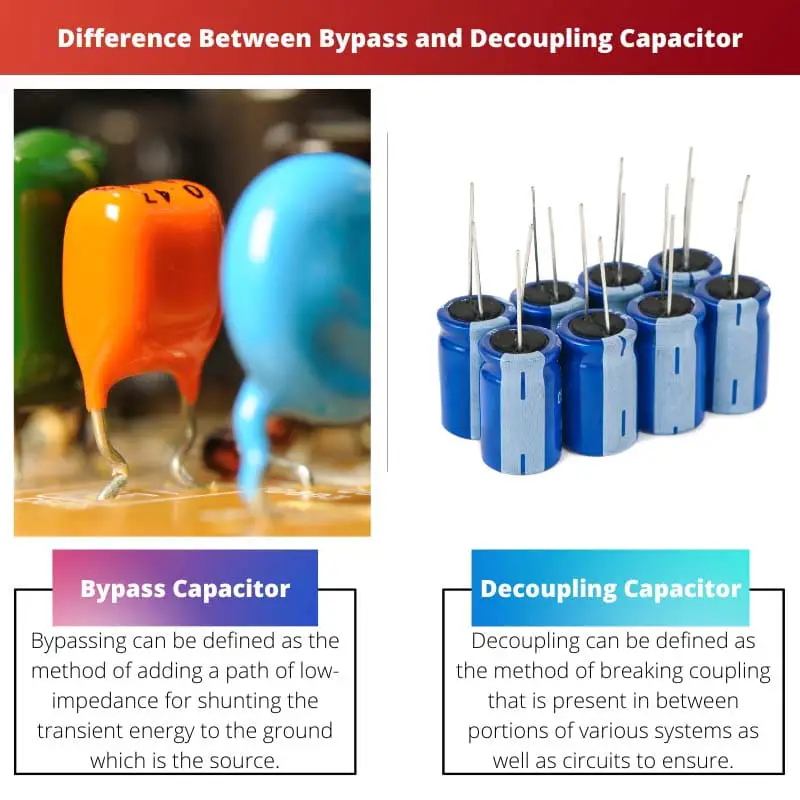Capacitors are one of the most commonly used components Which are passive. They are used in almost all power electronic as well as analog circuits.
The Bypass capacitor and Decoupling Capacitor are very commonly used applications that are used when referring to a capacitor.
Key Takeaways
- Bypass capacitors remove noise and unwanted high-frequency signals while decoupling capacitors isolate different circuit components to prevent interference.
- Bypass capacitors are connected in parallel with a power supply, whereas decoupling capacitors are placed between the power supply and the active component.
- Both capacitors help in maintaining stable voltage levels and improving overall circuit performance.
Bypass vs Decoupling Capacitor
The difference between the two is that Bypass capacitors are used for shunting the noise signals while Decoupling capacitors are used for smoothening these signals. However Bypass capacitors and Decoupling capacitors are used by many people interchangeably.

The Bypass capacitors have their uses in almost all circuits, analog or digital. They are used to remove the signals that are unwanted from the voltage supply.
It prevents the noise to enter the main system by bypassing the signal to the ground.
Decoupling capacitors are used for two purposes. One is that it is used for The removal of power distortion and also noise.
The other is that it provides pure DC supply and thus protects the system. A decoupling circuit is one of the most important components when it comes to logic circuits.
Comparison Table
| Parameters of Comparison | Bypass | Decoupling capacitor |
|---|---|---|
| Definition | Bypassing can be defined as the method of adding a path of low-impedance for shunting the transient energy to the ground which is the source. It is a requirement for proper decoupling. | Decoupling can be defined as the method of breaking coupling that is present in between portions of various systems as well as circuits to ensure that the operation is done properly. |
| Used for | It is used for shunting any unwanted noise signals. | It smoothens the unwanted noise signals by stabilization of the distorted ones. |
| Value of the capacitors | The capacitance value of the capacitor should be 73µF across a 440 Ω resistor. | For the noise of low frequency, the value should be1 µF to 100 µF and that for high frequency should be 0.01 µF to 0.1 µF. |
| Placement | Bypass Capacitors are placed near the power supply and the power supply pins. | Decoupling capacitors are placed in between the load or the IC and the power supply. |
| Applications | Used in between a loudspeaker and an amplifier for the production of clear audio. | It is used mainly in logic circuits. |
What is a Bypass?
The main work of the bypass capacitor is to bypass the unwanted noise or communication to the ground which is generated from the Power line to the electronic circuit.
It can bypass all sorts of noise that appear on the power line and prevent it to enter the main system and thus the name, bypass capacitor.
It is designed in such a way that there is not much distance between the capacitors and the power supplies and the power supply pins present in the connector.
The alternating current or AC is thus passed through and direct current or DC is maintained within the active block with the help of these caps.
Bypass capacitors can suppress bit inter and intrasystem noises in different devices and different other components.
When the capacitor which is large enough is connected across the cathode resistance it acts as a short circuit for the frequency of audio thus eliminating the negative feedback.
The bypass capacitor also acts as a good open circuit for a Direct current and thus helps to maintain the DC grid bias.
Bypass capacitors are used for various purposes:-
- It is used in AC and DC converters.
- It is used in signal coupling and also decoupling.
- They are used for producing clear audio between the amplifier and loudspeaker.
- It is used for both High Pass and Low Pass Filters.
What is a Decoupling Capacitor?
Decoupling capacitors are used for decoupling AC signals from DC signals or even vice versa. It mainly isolates or decouples two different circuits. It is also used to isolate a local circuit from an external one.
Decoupling capacitors are widely used and there are specific standards for choosing the value. The value of the low-frequency noise capacitor is between 1 µF to 100 µF.
The value of the high-frequency noise capacitor is between 0.01 µF to 0.1 µF. For the operation of the capacitor to be effective, one should always connect the decoupling capacitors directly to a low impedance ground plane.
The decoupling capacitors are to be placed in between the load and the power supply in a manner that is parallel to one another.
When the circuit is receiving power from the DC power supply it will create infinite reactance on the DC signals and therefore will not have any resulting effects on them, but it tends to have reactance that is much low on the AC signals.
These types of capacitors create a path of low impedance for the signals which are of high frequency for getting in shunted which gives rise to a clean and clear DC signal.
Main Differences Between Bypass and Decoupling capacitor
- The bypass capacitor is specifically used when there is the presence of a resistor connection that is connected to both the ends of the resistor for a smooth passage of the AC signal while a decoupling capacitor is used when there is no need for an AC to eliminate self-excitation and also amplifier stabilization. It is used in the amplifier circuit.
- The placement of the Bypass capacitors is near the power supply and the power supply pins and that of the Decoupling Capacitor is in between the load and the power supply.
- A bypassing is required for a proper decoupling but the vice-versa is not true.
- Bypass circuits are mainly used in a high pass and low pass filters while decoupling capacitors are mainly used in logic circuits.
- Bypass capacitors can shunt any type of unwanted noise signal but decoupling capacitors do not shunt but smoothen these signals.

- https://ieeexplore.ieee.org/abstract/document/485094/
- https://ieeexplore.ieee.org/abstract/document/1613147
